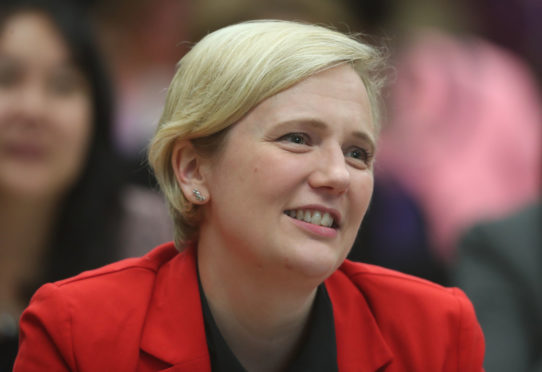“I washed a fork, ” I tell Mr R proudly.
It’s one of his first weeks back at work after Maya’s birth and he’s asking about my day. Disappointingly, that’s all I can come up with. We both look at the huge pile of dishes by the sink and laugh.
Several more pieces of cutlery to go then…
My pride remains intact, however, as even getting round to doing part of a chore seems like a victory amid the conveyor belt of feeds and nappy changes.
Naively, I now realise, I thought I’d get loads done while on maternity leave – all those jobs there’s never time for. I also had lists of the many books I’d read and new recipes I’d cook. But – most importantly – having worked for a decade, I was excited about spending a quality first year with the little person about to enter our lives.
Thankfully, once in the swing of things at least, this last bit was easy and has remained my priority since leaving Westminster. The rest? Not so much, although I’ve learned to always have my Kindle in my bag in case Maya falls asleep in the car or pushchair and channelled my inner domestic goddess into making nutritious family meals.
Truthfully, I’ve never felt busier than in those first months and appreciated my maternity leave more than words can say.
It was wonderful not to have to worry about anything job-related, to know someone was covering in my absence.
Having had such a positive experience overall – albeit after a tough start – I was upset to read about the response Labour MP Stella Creasy received when she requested maternity cover, essentially a locum, for work conducted outside the Commons.
The mum-to-be said the Independent Parliamentary Standards Authority (Ipsa), which regulates MPs’ pay, told her they “don’t recognise that MPs go on maternity leave”, adding that parliament was forcing her to “choose between being an MP and a mum”.
While Ipsa does provide additional funding for all MPs’ offices to cover absences, alongside expenses for staff, it first asks for an explanation as to how the money would be spent.
In a nutshell, there’s no automatic provision of paid cover for members’ parental leave.
Similarly, at Holyrood, because MSPs are “not employed by the parliament but elected”, there is no formal entitlement to maternity leave, with arrangements a matter for the individual.
On the one hand, I can see how people might not have much sympathy for Creasy’s predicament.
MPs continue to be paid their full annual salary of £79,468 if they take time out after having a baby.
Moreover, unlike MPs representing constituencies further afield, as a London MP, she is spared a long commute to and from Westminster.
In addition, there are undoubtedly many who are worse off, as Tory MP Kemi Badenoch – also pregnant – was quick to highlight, saying she’d find it “hard to claim to a constituent on the minimum wage” that she has a “bad deal”.
Then there’s the self-employed who are entitled to maternity allowance if they’ve paid sufficient Class 2 National Insurance contributions, although this is unlikely to be enough to cover a replacement. All of that may indeed be true.
But so what? It doesn’t mean Creasy’s point isn’t a valid one. It absolutely is.
Westminster should be setting an example of best practice for the rest of the country, which it can’t do effectively unless its own standards are the highest.
Nor will the current rules help the cause of encouraging more women into politics.
And, as Creasy has herself underlined, communities shouldn’t be “penalised” for having a female MP.
If proper paid parental leave cover was offered as a matter of course – and remember we aren’t talking about longer-term childcare here, only the post-birth period – constituents’ concerns could be dealt with efficiently without MPs feeling guilty for having to cut back or making themselves ill by taking on too much.
Thankfully, progress on the issue seems forthcoming.
In January, after it emerged Labour MP Tulip Siddiq had delayed a Caesarean section to attend a vote on Theresa May’s Brexit deal, MPs backed a year-long proxy voting trial.
It allows those about to give birth or who have recently become a parent to nominate another MP to vote on their behalf.
Additionally, in response to the general question, Ipsa’s chair Ruth Evans has said the body supports proposals to allow maternity cover for MPs, explaining this would be something for the House of Commons to take forward.
Ultimately, when it comes to MPs’ pay, the bottom line is that the pennies come from the public purse, so getting value for money is crucial.
I don’t think a solution to this problem need require lots of extra cash, however. Rather, it is about creating a clear policy, formalising the process.
Maybe a percentage of the cover costs could be taken from an MP’s salary from a certain point onwards?
After all, few people enjoy full pay for the duration of their leave, with some just getting the statutory benefit.
Alternatively, Ipsa could consider a straightforward maternity cover tick box on paperwork so funding from the staffing budget could be automatically apportioned.
I don’t think any great changes are necessary.
But it is vital parliament gets its house in order – and quickly – so it can lead the way.
Lindsay Razaq is a journalist and former P&J Westminster political correspondent who now combines freelance writing with being a first-time mum

